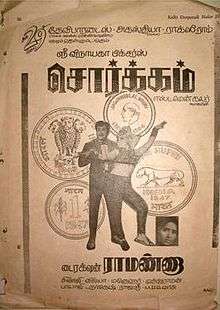Sorgam
Sorgam (transl. Heaven) is a 1970 Indian Tamil-language film starring Sivaji Ganesan, K. R. Vijaya, Rajasree, R. Muthuraman and K. Balaji in the lead roles. The film was directed by T. R. Ramanna. It was released on 29 October 1970 and became a major success, running for over 100 days in theatres.
| Sorgam | |
|---|---|
 Theatrical release poster | |
| Directed by | T. R. Ramanna |
| Produced by | T. R. Chakravarthi |
| Screenplay by | Sakthi T. K. Krishnasamy |
| Story by | Nannu |
| Starring | Sivaji Ganesan K. R. Vijaya Rajasree R. Muthuraman K. Balaji |
| Music by | M. S. Viswanathan |
| Cinematography | Amirtham |
| Edited by | T. R. Srinivasalu |
Production company | Sri Vinayaga Pictures |
Release date | 29 October 1970 |
Running time | 160 Minutes |
| Country | India |
| Language | Tamil |
Plot
Three graduates have different values and experience completely different things in life.[1]
Cast
- Sivaji Ganesan as Shankar (Charles Stage Drama)
- K. R. Vijaya as Vimala
- Rajasree as Anjana
- K. Balaji as Sampath
- R. Muthuraman as Kannan
- R. S. Manohar as Dharmalingam / Arun
- M. R. R. Vasu as Matrubootham / Bond / Ippi / Thevaram (Quad Role)
- Nagesh as Kajini
- Sachu as Savithri / Jothi / Puppy (Quad Role)
- Kanakadurga as Lakshmi (Shankar Sister, Kannan Wife)
- V. Nagaiah as Judge
- O. A. K. Thevar as Advocate
- Senthamarai as Police Inspector
- Ennatha Kannaiya as Harikrishnan
- M. Bhanumathi as Narikurathi
- Veeraraghavan as Headmaster
- Kallapetti Singaram as Snake Charmer
- Karikol Raju as Payilvan
- Karuppu Subbiah as (Taxi Owner)
- I.S.R as Adiyapatham (office Stafe)
- Gemini Mali as Gopi (office Stafe)
- Samikannu as Ayyakannu (Office Stafe)
- Comedy Shanmugam as (Office clerk)
- Master Ramu as Muthu (Shankar Son)
Special Appearance
- Vijayalalitha as (Dancer)
- Shabnam as (Dancer)
Themes
Writing for The Times of India, Ganesh Krishnamoorthy compared the act of Balaji's character betraying Ganesan's character to that of Brutus betraying Julius Caesar; the film features a play based on the incident where Balaji plays Brutus, and Ganesh says the play is a rehearsal for the actual betrayal being enacted at that moment.[2]
Soundtrack
The soundtrack was composed by M. S. Viswanathan.[3][4] The song "Ponmagal Vandhaal" was parodied in Pithamagan (2003),[5] and remixed by A. R. Rahman in Azhagiya Tamil Magan (2007).[6]
| No. | Song | Singers | Lyrics | Length |
|---|---|---|---|---|
| 1 | "Ponmagal Vandhal" | T. M. Soundararajan | Alangudi Somu | 03:22 |
| 2 | "Azhagu Mugam" | Jikki, S. Janaki | Kannadasan | 03:29 |
| 3 | "Sollathe Yarum Ketal" | T. M. Soundararajan | 03:10 | |
| 4 | "Oru Muttharathil" | P. Susheela | 03:29 | |
| 5 | "Naalu Kaalu Sir" | A. L. Raghavan, L. R. Eswari, S. V. Ponnusamy | 03:36 |
Release and reception
Sorgam was released on 29 October 1970, Diwali day.[7] It was the first film to be released at Devi theatre, which was inaugurated on 23 May 1970.[8] The Indian Express said on 7 November, "There are some films which try to go off the beaten track, and just when the viewer begins to say hurrah, they return to familiarity. Going off the beaten track in such cases appears to be a halt. This is what happens in Vinayaka Pictures Sorgam [...] You are at a loss to discover whether the director is brave or just cunning."[1] Despite being released alongside another Ganesan film Engirundho Vandhaal, the film was a commercial success,[6] running for over 100 days in theatres.[9]
References
- "Cinema". The Indian Express. 7 November 1970. p. 10.
- Krishnamoorthy, Ganesh (9 May 2016). "All the world's a stage, Tamil Nadu too". The Times of India. Archived from the original on 7 February 2019. Retrieved 7 February 2019.
- "Sorgam". JioSaavn. Archived from the original on 7 February 2019. Retrieved 7 February 2019.
- "Sorgam (1970)". Raaga.com. Archived from the original on 13 September 2012. Retrieved 7 February 2019.
- Pillai, Swarnavel Eswaran (2015). Madras Studios: Narrative, Genre, and Ideology in Tamil Cinema. India: SAGE Publications. p. 275. ISBN 9789351502128.
- Jeshi, K. (1 November 2013). "Released on Deepavali". The Hindu. ISSN 0971-751X. Archived from the original on 12 February 2014. Retrieved 7 February 2019.
- Ramji, V. (29 October 2018). "ஒரேநாளில் ரெண்டு சிவாஜி படங்கள் – எங்கிருந்தோ வந்தாள், சொர்க்கம்; 48 வருடங்கள்" [Two Sivaji films on the same day – Engirundho Vandhaal, Sorgam; 48 years]. Kamadenu. Archived from the original on 7 November 2018. Retrieved 6 February 2019.
- Kumar, S. R. ashok (25 June 2020). "Lasting icons of showbiz: A look at Tamil Nadu's most iconic cinema halls". The Hindu. Archived from the original on 26 June 2020. Retrieved 26 June 2020.
- Ganesan, Sivaji; Narayana Swamy, T.S. (2007) [2002]. Autobiography of an Actor: Sivaji Ganesan, October 1928 – July 2001. Chennai: Sivaji Prabhu Charities Trust. p. 242. OCLC 297212002.